

This week, The English Apple Man spent a day with Darren Wallis AC Goatham's Technical Manager visiting a number of fruit farms in the AC Goatham business. the largest apple and pear growing business in the UK.
The business has changed considerably since it was started in 1947 by Clive's parents, Arthur and Phyllis Goatham, who began buying fruit directly from the farm gate, picking it, packing it and taking it to wholesale markets.
Today ACG grow apples and pears on 26 farms totalling circa 3,000 acres spread across Kent from their headquarters at Flanders Farm, Hoo, Rochester on the Isle of Grain to Farms in East Kent
My day with Darren 'consolidated my appreciation' of what it takes to build a business of this size and scale. There are many key factors which collectively demonstrate the holistic nature of success!
There are many very good growers growing equally excellent apples and pears, but few who manage to succeed on the massive scale of AC Goatham.
It starts at the top and Clive Goatham is a remarkable but in many ways an 'understated' leader. I have observed over a number of years he has built a management structure where he chooses high quality managers, and importantly allows them to manage!
Growing on this scale also requires a 'uniform orchard system' as we drive around the thousands of acres, the uniformity of growing system and uniformity of trees within each row is outstanding!
For an understanding of the ACG history. Click on: AC Goatham celebrates 70 years
The English Apple Man has known Clive and Ross Goatham for nearly 30 years, and watched Clive grow the business from a solid but modestly sized grower, packer and marketeer in the mid 1990's to the largest apple and pear grower in the UK Today!
Darren Wallis, AC Goatham and Sons Technical Manager.
Darren has been part of the ACG team for more than 10 years!
His key responsibilities are pre-harvest fruit quality testing, storage potential sampling, maturity testing, providing orchard information for harvest and crop estimates, post-harvest store monitoring, assisting other members of our technical team, working with our partner growers, food safety compliance, residue testing, wastewater, and irrigation water testing and recording, chemical shed audits, Environment agency licenses, and permits and providing key information to assist the Cirrus team.
We are absolutely delighted to announce that we have been awarded the highest standard of an AA* Grade from our recent BRC audit.
A BRC Audit, or BRC Food Safety Audit, is the British Retail Consortium's official assessment of a food manufacturer's adherence to the BRC Global Standard for Food Safety.
This award recognises both service and quality within our industry, offering assurance and confidence to our loyal customers.
For a quick appreciation Click on: Quality apples in the orchard and packhouse
Although I have visited many (but not all) of ACG's farms, I was particularly keen to visit the new pear orchard at Swanton Farm.
Looking back; "within the growing community, many felt we could no longer compete with pear growers on the continent. Belgian and Dutch growers with a perceived ideal climate and modern intensive systems could no be matched!
But 10-15 years ago, some forward thinking growers, advised by specialists from the Benelux countries set out to challenge the perception.
Below: Some of the first V system pear orchards planted in East Kent. left. a young orchard and right. an established orchard.
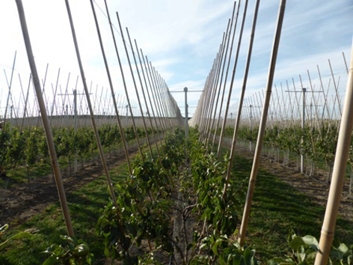
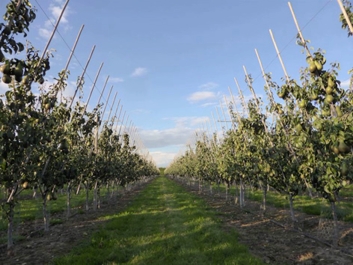
Below: The new conference pear orchard at Swanton Farm which covers 100 acres
Below: End view of concrete support structure in new pear orchard
The current (new) support structure, uses concrete posts, replacing the previous standard of wooden posts.
Darren said they have had the occasional row with a heavy crop blow over in high winds and when individual posts need replacing, which is difficult and a time consuming task, and although the choice of concrete is initially more expensive, the concrete post is a better choice for longer term ECONOMY and should last more than the lifetime of the orchard.
Mowing in progress; it's standard practice to leave an alley (one in three) unmowed growing wild flowers encouraging beneficial insects
The main varieties of apple are Gala and Braeburn which will be marketed well into the next summer {June and July?) having benefitted from the latest storage technology. Cameo is also an important variety, and the Club variety Jazz tm and Magic Star rapidly increasing acreage and volume.
Below: l-r. Royal - Gala - Magic Star - Cameo - Jazz tm
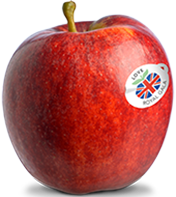
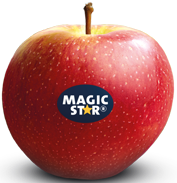
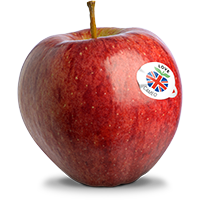
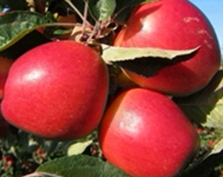
Below: Cameo trees and right. a good set of Cameo
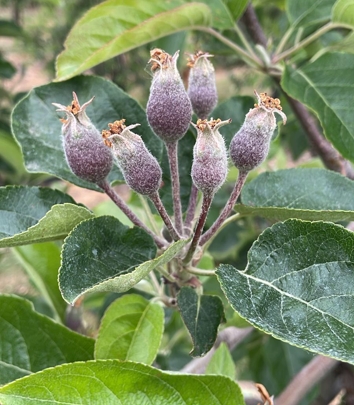
Below: Magic Star growing well
Below: Magic Star fruitlets show a heavy set
The appeal of Magic Star is it's ability to store well and deliver great flavour and texture even after one year in store.
For British apple growers the possibility of supplying Magic Star after the traditional Gala and Braeburn extending the 'home grown' season beyond the traditional April/May through June & July until the new season starts again in August/September.
In 2020 The English Apple Man went to Holland and Belgium with a group led by Nigel Jenner and realised the potential of this 'unique variety: Magic Star is in the opinion of The English Apple Man a 'game changer' - this variety can be eaten straight off the tree at harvest and the same apples will store for a year and still deliver the same eating quality. This allows growers the opportunity to store Magic Star until next July/August and follow on from Gala and Braeburn extending the supply of high quality apples up until the best new season apples come on stream in September.
All other dessert apples targeted for long term storage must be picked and stored quickly just as the starch levels are beginning to fall. The criteria may be slightly different for specific varieties, but none can be left on the tree to the point where the variety eats very well AND can be stored 'successful until the following season and deliver the same eating quality.
Below: Young Jazz tm trees in 2nd leaf carrying a good set of apples, maybe requiring thinning
Above - Jazz tm is now well established as the leading club variety grown in the UK.
Below: A new Braeburn orchard at Griffin's Farm. The uniform planting with trees 3ft apart in the row and rows 3.5 metres apart and tree height once established at 3 metres. Tree numbers 2,500 per hectare.
Below: This picture epitomizes the UNIFORMITY mentioned as the key to success
The English Apple Man Comments
The success of AC Goatham can be seen clearly in the ACG Website below
Click on: AC Goatham & Son
![]() That is all for this week
That is all for this week
Take care
The English Apple Man